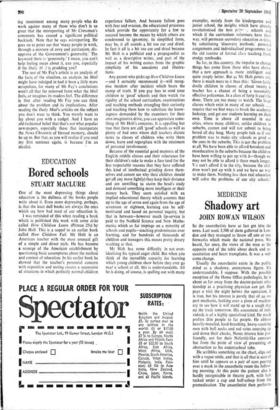Bored schools
EDUCATION STUART MACLURE
One of the most depressing things about education is the dullness of the books people write about it. Even more depressing, perhaps, is that the least dull books are always the ones which say how bad most of our education is.
I was reminded of this when reading a book which is published this week with some éclat called How Children Learn (Pitman 25s) by John Holt This is a sequel to an earlier book called How Children Fail. Mr Holt is an American teacher with the most unusual gift of a simple and direct style. He has become a scourge of tbe American establishment by questioning basic assumptions about the method and content of education. In his earlier book he showed that the teacher's perennial concern with exposition and testing creates a succession of situations in which perfectly normal children
experience failure. And because failure goes with fear and evasion, the educational processes which provide the opportunity for a few 'to succeed become the means by which others are condemned to ignominy. In simplified form, may be, it all sounds a bit too cut and dried. In fact it all is a bit too cut and dried because Mr Holt is a publicist and a propagandist as well as a descriptive writer, and part of the impact of his writing comes from the graphic simplicity of his anecdotes and illustra- tions.
Any parent who picks up How Children Learn —and 1 certainly recommend it—will recog- nise incident after incident which bears the stamp of truth. If you pay fees to send your children to `good' school's and then watch the rigidity of the school curriculum, examinations and teaching methods strangling their curiosity and teaching them-how to substitute the know- ingness demanded by the examiners for their own imaginative drive, you can appreciate some- thing of Mr Holt's concerns. It is appalling but true that there are still 'good' schools as well as plenty of bad ones where dull teachers dictate notes to classes of children who write them down, learn and regurgitate with the minimum of personal involvement.
Because of the essential good manners of the English middle classes and their reluctance for their children's sake to make a fuss (and for the less respectable reasons that they have suffered this kind of intellectual grinding down them- selves and cannot see why their children should getoff any more lightly) they keep their distance and are unwilling to storm the head's study and demand something more intelligent or their money back. They seem satisfied with an implied educational theory which assumes that up to the age of seven and again from the age of seventeen or eighteen, learning can be self- motivated and based on personal inquiry, but that in between—however much lip-service is paid to the Nuffield Science and New Mathe- matics which so far impinge on a minority of schools and pupils—teaching predominates over learning, and for hundreds of thousands of children and teenagers this means pretty dreary teaching at that.
Mr Holt has some difficulty in not over- idealising his typical eager child. But when you think of the incredible capacity for learning which young children show before they ever go near a school at all, this is understandable. All he is doing, of course, is spelling out with many examples, mainly from the kindergarten and junior school, the insights which have already revolutionised the best prirr---j schools and which if the curriculum -reformers have their way, will permeate secondary education in time, by substituting 'discovery methods,' personal assignments and individualised programmes for the old routine of formal class teaching from stodgy textbooks.
So far, in this country, the impulse to change things has come from those who have shown that a new approach is more intelligent and quite simply better. But as Mr Holt points out, there is much morn to it than this: 'Given fairly docile children in classes of about twenty a teacher has a chance of being a reasonably effective policeman. In a class of forty it can't be done. There are too many to watch. The large classes which exist in many of our schools require that we find ways to break the academic lockstep, and get our students learning on their own. Time is above all essential in our cities, where many children, unlike children in suburbs, cannot and will not submit to being bored all day long. Many people talk as if our problem was to make 'city schools as good as the ones in the suburbs. This is not the problem at all. We have been able to afford boredom and miseducation in the suburbs because the children have .been- willing to put up with it—though we may not be able to, afford it there much longer. 'We can't afford it in the city, because the chil- dren won't put up with it and we have no way to make them. Nothing less than, real education will solve the problems of our city schools.'










































 Previous page
Previous page